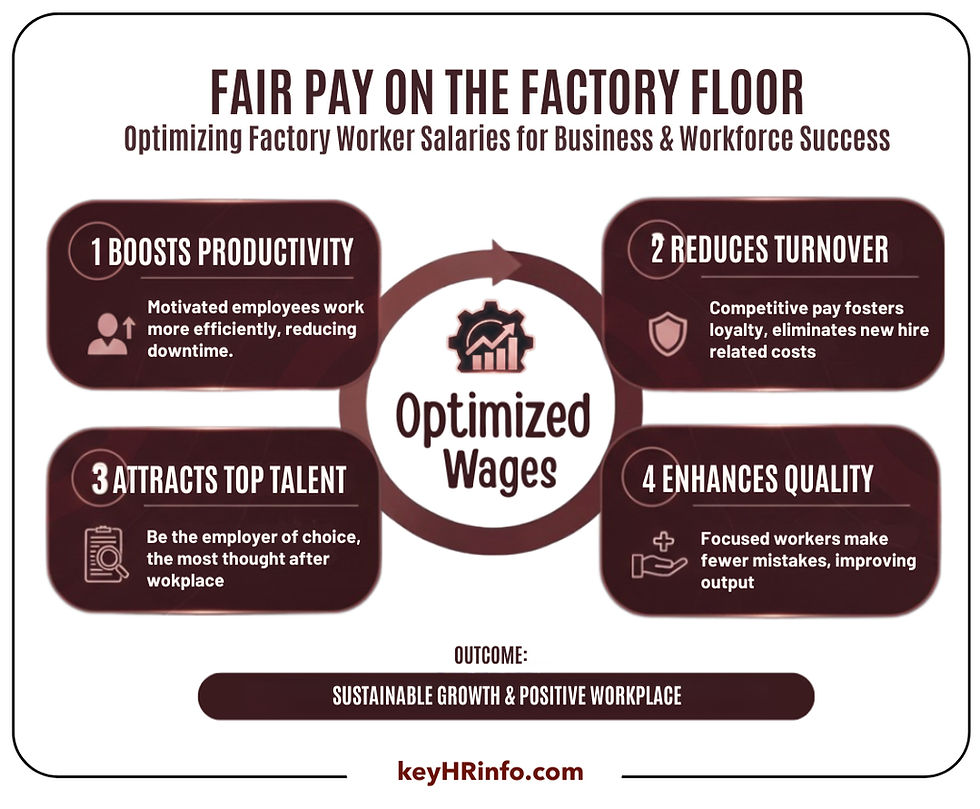Hidden Dangers: How to Safeguard Your Payroll Against Irregularities
- Team of keyHRinfo.com
- Sep 17, 2025
- 4 min read
keyHRinfo.com offers services in areas of payroll implementation, payroll data migration, payroll consolidated reports and analytics to international companies with presence in Hungary.
Maintaining a seamless payroll process is crucial for every organization. Payroll irregularities can lead to serious consequences, including financial discrepancies, legal issues, and diminished employee morale. These irregularities can occur for a variety of reasons—from human error to outdated software systems. Understanding how to identify and prevent these issues is essential for safeguarding your payroll against irregularities.
This blog post aims to provide you with actionable insights and strategies to prevent irregularities in payroll, ensuring your business remains compliant and your employees remain satisfied.
Understanding Payroll Irregularities
Payroll irregularities refer to discrepancies or errors that occur during the payroll process. These can manifest in various forms such as incorrect employee classifications, miscalculated earnings, or failure to comply with tax regulations.

These errors can happen due to several factors, including:
Manual entry mistakes in payroll software
Changes in tax laws that haven’t been properly implemented
Miscommunication between departments regarding employee wage rates or hours worked
Recognizing the various forms of payroll irregularities is the first proactive step in prevention.
Implementing Robust Payroll Systems
The Role of Technology and Payroll
One of the most effective ways to reduce the risk of payroll irregularities is by implementing robust payroll systems that leverage advanced technology. Payroll software can automate calculations, ensuring accuracy and compliance with tax regulations.
Automated Payroll Systems:
Efficiency: Automation reduces the time taken to process payroll—eliminating manual errors associated with data entry.
Compliance: Most payroll systems are regularly updated to reflect changes in tax laws, helping businesses stay compliant with government regulations.
Reporting Capabilities: Automated systems provide insights and reports that can help identify discrepancies during audits.
Investing in a reliable payroll system pays dividends in the long run. Research options available in the market to find a solution that aligns with your organizational needs.

Regular Software Updates
Ensuring your payroll software is regularly updated is vital. Outdated software may not only have bugs that can cause errors, but it may also lack updates that incorporate new tax regulations or security features.
Establish a routine for checking and implementing software updates, along with reviewing user manuals for new features.
Training The Payroll Team
Importance of Ongoing Education
Even the best payroll systems can be undermined by a lack of understanding among staff. Regular training sessions ensure your payroll team is updated with best practices and equipped to utilize the software effectively.
Key Training Areas:
Legal Regulations: Keeping staff informed about labor laws and tax regulations is crucial in avoiding non-compliance.
Software Skill Development: Encourage ongoing training in using payroll systems for effective data entry and reporting.
Error Prevention: Train staff to double-check data entries and understand the audit process.
Establish Clear Procedures
Implementing clear payroll procedures can minimize miscommunications and errors.
Optimize Communication: Streamline communication with other departments, such as HR and finance, to ensure timely updates on employee statuses.
Checklist for Key Stages: Develop checklists for important payroll processing stages—such as data collection, verification, and approval—ensuring nothing is overlooked.
Error Reporting Protocols: Create a system for reporting discrepancies or issues quickly so they can be addressed in a timely manner.
Conducting Regular Audits
Importance of Internal Audits
Regular internal audits of your payroll processes can help in identifying irregularities and inefficiencies that may not be visible during day-to-day operations.
What to Look For During Audits:
Comparison of Payroll Records: Ensure that payroll records match employment contracts and timekeeping data.
Tax Compliance: Verify that all taxes withheld are accurate and submitted on time.
Employee Classifications: Check to ensure that employees are classified properly, as misclassification can lead to severe penalties.
Third-Party Audits
Consider hiring third-party firms to carry out payroll audits, particularly if your organization is large or has complex payroll needs.
Benefits of Third-Party Audits:
Objectivity: An independent third party can provide a fresh perspective and uncover flaws that internal teams may overlook.
Expertise: They bring specialized knowledge and experience that can lead to enhanced compliance and procedures.
Encouraging Employee Feedback
Open Communication Lines
Encouraging feedback from employees can help identify areas of concern that management may miss. Create an environment where employees feel comfortable discussing payroll issues.
Methods for Gathering Feedback:
Anonymous Surveys: Use surveys to allow employees to voice their opinions about the payroll process and experiences.
Regular Meetings: Implement regular check-ins where payroll topics can be discussed openly.
Addressing Feedback Promptly
When feedback is received, addressing it in a timely manner is vital. If employees express concerns about irregularities, take immediate action to investigate and rectify the issue.
Transparency goes a long way in building trust and satisfaction among employees, especially regarding their compensation.
Preventing irregularities in payroll is essential for financial accuracy and employee satisfaction. By implementing robust payroll systems, investing in employee training, conducting regular audits, and encouraging open communication, organizations can significantly reduce the risks associated with payroll errors.
As payroll continues to evolve with technology, leaders must adapt and create an environment that prioritizes accuracy and compliance. Staying proactive and vigilant will not only safeguard your payroll process but ultimately contribute to the overall health of your organization.
Ensuring that payroll runs smoothly is not just about meeting deadlines; it’s about fostering a team that feels valued and understood. By implementing these best practices, businesses can protect themselves from the hidden dangers that come with payroll irregularities, paving the way for a thriving workplace.
FAQ: Safeguard Your Payroll Against Irregularities
What are payroll irregularities?
Payroll irregularities are errors or inconsistencies in payroll processing, such as incorrect payments or unauthorized changes.
How can payroll irregularities impact a business?
They can lead to financial losses, legal penalties, and decreased employee trust.
What steps can help prevent payroll irregularities?
Implementing regular audits, using secure payroll software, and maintaining clear approval processes help prevent issues.
Why is employee data accuracy important for payroll security?
Accurate employee data ensures correct payments and reduces the risk of fraud or mistakes.
How often should payroll processes be reviewed for irregularities?
Payroll processes should be reviewed and audited at least quarterly to detect and address any irregularities promptly.
keyHRinfo.com offers innovative HR and Payroll services for startups from reviewing the needs, to the solution proposal, implementation and operational phases. Also ongoing assistance for operational, audit and Mergers and Acquisitions.
_edited.png)


